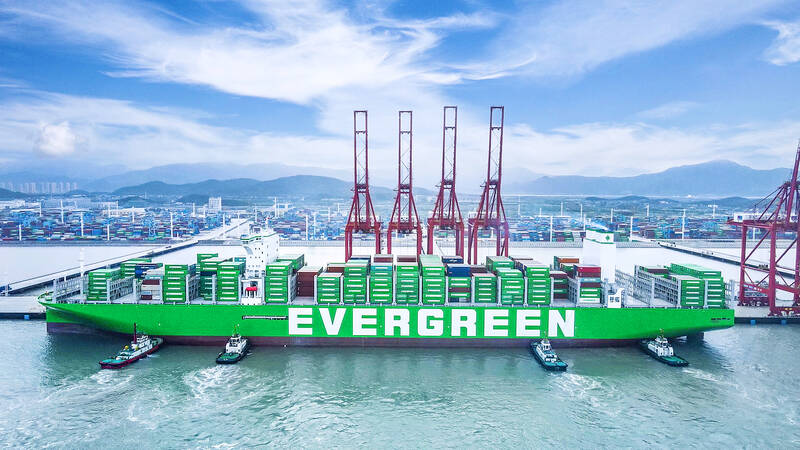Evergreen Marine Corp (長榮海運) gave a conservative profit growth outlook for this quarter, as demand and freight rates retreated amid a strong US dollar and surging inflation, but its full-year profit could exceed that of last year, president Eric Hsieh (謝惠全) told an investors’ conference in Taipei yesterday.
The shipper’s third-quarter revenue grew 19 percent to NT$169 billion (US$5.3 billion), slower than an annual expansion of 75 percent in the second quarter and 91 percent in the first quarter, company data showed.
“The third quarter is historically a peak season for shipping, but freight demand last month plunged due to surging inflation. We do not expect a quick rebound this quarter, unless the inflation issue is resolved,” Hsieh said.

Photo courtesy of Evergreen Marine Corp
Nonetheless, Evergreen should be able to stay in the black this quarter, with profit this quarter possibly surpassing that of the same period last year, he added.
With the Shanghai Containerized Freight Index, which reflects spot freight rates on major routes, further declining this week to 1,814 yesterday, Hsieh said that Evergreen is facing pressure from some clients to reduce rates.
Clients, especially those from American and European markets, have asked that the gap between their contract rates and spot rates be reduced, and Evergreen has discussed the issue with them on a case-by-case basis, he said.
Most clients in Asian markets are sticking to their contracts, he added.
Average shipping rates slid to US$2,529 per twenty-foot-equivalent unit last month, falling for the second straight month from US$2,978 in July, compared with a peak of US$3,222 in February, company data showed.
The improvement in congestion at seaports worldwide might have helped lower shipping rates, and the average punctuality rate has recovered to about 45 percent — albeit still far below the pre-COVID-19 level of 70 percent, he said.
Evergreen is conservative, but not pessimistic about next year, Hsieh said, adding that he does expect a net loss next year.
Demand for shipping would be affected by inflation and Russia’s invasion of Ukraine, but global economic growth is forecast to remain in positive territory, Hsieh said.
Even though global shipping capacity would rise next year as shippers receive new vessels, growth would be limited by the implementation of new environmental regulations, or the Carbon Intensity Indicator, Hsieh said.

SECTOR LEADER: TSMC can increase capacity by as much as 20 percent or more in the advanced node part of the foundry market by 2030, an analyst said Taiwan Semiconductor Manufacturing Co (TSMC, 台積電) is expected to lead its peers in the advanced 2-nanometer process technology, despite competition from Samsung Electronics Co and Intel Corp, TrendForce Corp analyst Joanne Chiao (喬安) said. TSMC’s sophisticated products and its large production scale are expected to allow the company to continue dominating the global 2-nanometer process market this year, Chiao said. The world’s largest contract chipmaker is scheduled to begin mass production of chips made on the 2-nanometer process in its Hsinchu fab in the second half of this year. It would also hold a ceremony on Monday next week to

TECH CLUSTER: The US company’s new office is in the Shalun Smart Green Energy Science City, a new AI industry base and cybersecurity hub in southern Taiwan US chip designer Advanced Micro Devices Inc (AMD) yesterday launched an office in Tainan’s Gueiren District (歸仁), marking a significant milestone in the development of southern Taiwan’s artificial intelligence (AI) industry, the Tainan City Government said in a statement. AMD Taiwan general manager Vincent Chern (陳民皓) presided over the opening ceremony for the company’s new office at the Shalun Smart Green Energy Science City (沙崙智慧綠能科學城), a new AI industry base and cybersecurity hub in southern Taiwan. Facilities in the new office include an information processing center, and a research and development (R&D) center, the Tainan Economic Development Bureau said. The Ministry

ADVERSARIES: The new list includes 11 entities in China and one in Taiwan, which is a local branch of Chinese cloud computing firm Inspur Group The US added dozens of entities to a trade blacklist on Tuesday, the US Department of Commerce said, in part to disrupt Beijing’s artificial intelligence (AI) and advanced computing capabilities. The action affects 80 entities from countries including China, the United Arab Emirates and Iran, with the commerce department citing their “activities contrary to US national security and foreign policy.” Those added to the “entity list” are restricted from obtaining US items and technologies without government authorization. “We will not allow adversaries to exploit American technology to bolster their own militaries and threaten American lives,” US Secretary of Commerce Howard Lutnick said. The entities

Minister of Finance Chuang Tsui-yun (莊翠雲) yesterday told lawmakers that she “would not speculate,” but a “response plan” has been prepared in case Taiwan is targeted by US President Donald Trump’s reciprocal tariffs, which are to be announced on Wednesday next week. The Trump administration, including US Secretary of the Treasury Scott Bessent, has said that much of the proposed reciprocal tariffs would focus on the 15 countries that have the highest trade surpluses with the US. Bessent has referred to those countries as the “dirty 15,” but has not named them. Last year, Taiwan’s US$73.9 billion trade surplus with the US